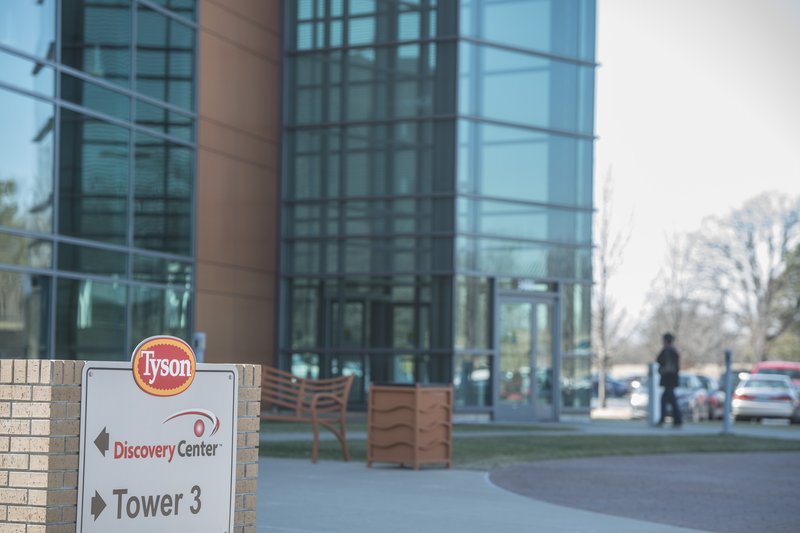Tyson Foods Inc. has agreed to pay just under $2.16 billion for a segment of a Brazilian meat conglomerate that is a key supplier to the McDonald's fast-food chain.
The acquisition of Keystone Foods LLC, a maker of chicken nuggets and other prepared foods, was officially announced Monday by Tyson and Brazil-based Marfrig Global Foods after a string of news reports over the weekend about the pending sale.
The price for Keystone was listed in documents filed Monday with the Securities and Exchange Commission. It was less than a previously reported $2.5 billion. Along with the increased exposure to McDonald's, the sale expands Tyson's "value-added" protein capabilities.
"Keystone offers a significant foundation for international growth with operations and exports in the fast-growing Asia Pacific region, as well as exports into key markets in Europe, the Middle East and Africa," Tom Hayes, Tyson's president and chief executive officer, said during a conference call held Monday morning.
Hayes said the acquisition adds to Tyson's scale and extends its supply chain to "better serve key food-service customers."
The acquisition includes six U.S. processing plants and 11 international facilities located in China, South Korea, Malaysia, Thailand and Australia. Tyson expects annual cost savings of $50 million by the third year of the acquisition. The transaction excludes one Keystone plant in Ohio that makes hamburgers.
Keystone Foods supplies chicken, beef, fish and pork to restaurant chains and retail and convenience stores around the world. It processes chicken nuggets, wings and tenders; beef patties; and breaded fish filets. It is one of the largest U.S. suppliers of chicken nuggets to McDonald's.
The company, based in West Chester, Pa., employs 11,000 people.
In the deal, Marfrig Global Foods kept its Ohio-based hamburger plant. Marfrig said in a Monday news release that the burger plant generates about $300 million a year, or 11 percent of Keystone's annual revenue. Keystone was acquired by Marfrig in 2010 for $1.26 billion.
Marfrig management told investors this spring of the company's plans to sell Keystone so it could offset debt accrued from acquiring a majority ownership of U.S.-based National Beef in April for $969 million. That deal made Marfrig the world's second-largest beef processor.
The Brazilian company announced in May that it had narrowed the sale down to five unnamed suitors. Around that time, Reuters and Bloomberg News reported that two of the finalists were Springdale-based Tyson Foods and George's Inc.
Tyson's acquisition of Keystone comes at a time when chicken and pork prices have softened because of tariffs on U.S. meats, enacted by key trade partners in response to the Donald Trump administration's tax on foreign metals. Tyson's leaders seemed disappointed in the company's earnings for the quarter ending June 30, particularly in its chicken segment. Hayes attributed the slump to increased volatility and competitive pricing costs in domestic and foreign markets as a result of a U.S. meat glut.
In Monday's conference call, Robert Moskow of Credit Suisse asked Hayes if management felt any kind of tariff pressure with Keystone.
"No. I can't say that we necessarily see that," Hayes said.
The most recent acquisition by Tyson that's comparable to Keystone was the April 2017 purchase of AdvancePierre for $4.2 billion. Since then, the nation's largest meat company has agreed to purchase Tecumseh Poultry, a producer of organic chickens, and American Proteins, a meat renderer.
Farha Aslam, a Stephens Inc. analyst, updated investors on the definitive agreement Monday. Aslam said in a research note that "our view on the acquisition is mixed."
"The transaction does offer Tyson significant synergy opportunities and a solid international business, the deal does increase the company's exposure to McDonald's, a restaurant chain that offers suppliers steady business but at thin margins," she wrote.
During the conference call, analysts expressed concern about how certain food customers, like McDonald's, may respond to the consolidation of Tyson and Keystone. However, Aslam wrote that Tyson's leaders "reiterated confidence in Tyson's ability to better service strategic customers" this way.
Shareholders responded positively to the deal. Tyson shares climbed 1.6 percent, or $1, to close Monday at $63.40 on the New York Stock Exchange. Shares have traded as high as $84.65 in the past 52 weeks and as low as $56.79.
Business on 08/21/2018

